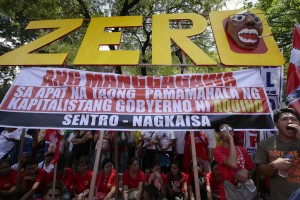
Workers shout slogans as they hold a rally near the Presidential Palace to mark the Labor Day celebrations on Thursday, May 1, 2014 in Manila, Philippines. The sign reads: Workers Have Zero Benefits In The Four Years of Capitalist Government of Aquino. AP FILE PHOTO
MANILA, Philippines—While he also envisions government employees getting top money, President Aquino said Friday this should be tempered by what the government could afford without going deeper into debt.
“That has been our dream from the start. Singapore is able to hire really very good people primarily because its public sector salaries are almost at 80 percent of its private sector counterparts. For our government, it’s just 20 percent,” the President said at a press conference during a visit to assess Bohol’s post-quake rehabilitation efforts. “Having said that, will we support it? That is our ambition. The question is, can we do it?”
The Palace released to the media a transcript of Mr. Aquino’s speech and remarks at a press conference in Tagbilaran.
Presidential Communications Operations Office Secretary Hermino Coloma said that the President directed the Department of Budget and Management to review the government pay system and “determine the impact of the recently completed third tranche of the salary standardization law on the compensation structure of the government, especially in comparison with the private sector.”
Budget Secretary Florencio Abad said salaries of government workers were higher than their private counterparts at entry level positions. “But private sector personnel enjoy much higher pay at the middle management level and even higher still at top management level,” said Abad in a text message.
The President said the sheer size of the bureaucracy —1.6 million — has forced him to give pause to recurring petitions from Congress and unions to increase the public servant’s pay.
“Before we think of raising salaries, government benefits, it might be better if we think of paying our obliigations to former employees of the government,” said the President, referring to the P4.3 trillion seed money (65 percent more than the P2.6 trillion annual national budget) needed to sustain the pension of retired soldiers and police.
Coloma said the President was still addressing the need to identify fund sources for the large amount of unfunded pension benefits for retired AFP personnel that are indexed to compensation.
“From a politician’s perspective and I am also a politician, then I give. That is a beautiful thing say. But I think if I have one reputation with our people, it is that I do not tell lies. I will not build false promises,” the President said.
Coloma said Congress should consult with the Executive on whether their proposed salary hikes have funding sources during budget deliberations.
“While the Executive branch recognizes the legislature’s prerogative to propose a new salary standardization law, this also needs to be vetted at Cabinet level in terms of its rationale and its budget implications,” said Coloma.
The President also cautioned against the tendency among state employees, specifically public school teachers, to take on more debt as their their their salaries increase as this would lead to diminishing take-home pay.
“I am more inclined for other incentives rather than cash. That will be more permanent. For instance, as an example, the 50,000-plus housing units we gave to the AFP and PNP. If we can expand that to everybody,” said the President.